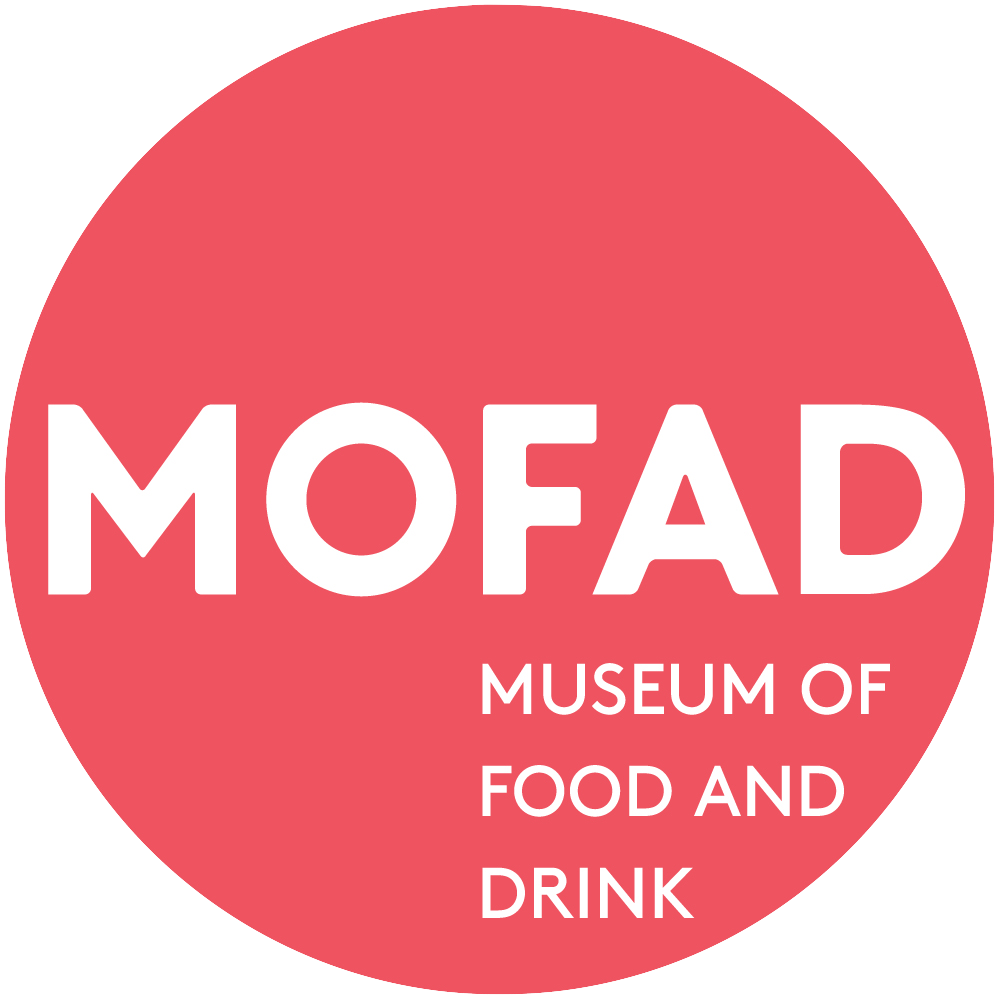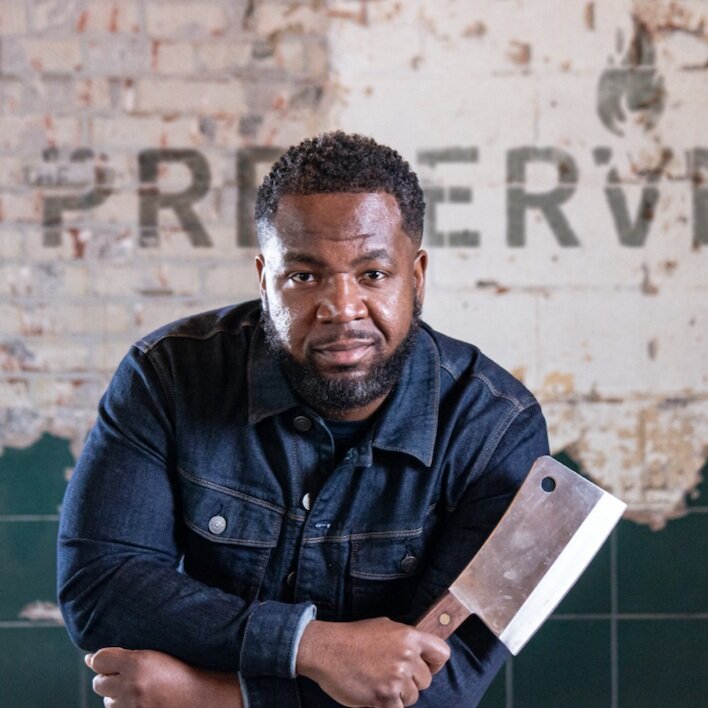Across the United States, the popularity of barbecue has exploded with regional specialties in every state—but are we honoring the foregoers of this culinary tradition? Often erased from American history, enslaved Africans wrote the narrative for the modern story of American barbecue.
Join rocket scientist and BBQ historian Howard Conyers, PhD and pitmasters Ed and Ryan Mitchell, for a virtual celebration in homage to the Black culinary heritage of American BBQ and a conversation led by culinary historian Adrian Miller, author of the upcoming book, Black Smoke: African Americans and the United States of Barbecue, that explores the preservation of African American foodways, Black perseverance, culinary innovation, and entrepreneurship.
We will also premiere the debut screening of MOFAD’s original virtual reality short film featuring Jones Bar-B-Q as part of our upcoming exhibition, African/American: Making the Nation's Table.
Immerse yourself in the fiery pit and busy kitchen of Debra “Shorty” and Mary “Little” Jones’s intergenerationally-owned restaurant in Kansas City, Kansas.
HOWARD CONYERS
Dr. Conyers, Rocket Scientist Pitmaster from Paxville, SC, is the founder of Conyers Family BBQ, From The Low Country to the Bayou, and GUMBO JUBILEE. After over 20 years of learning history of the south and a PhD in Mechanical Engineering, he has worked for NASA for over 10 years. He officially launched his Conyers Family BBQ LLC in 2016 to be a pitmaster, cultural food educator, and STEM expert to the New Orleans Area. Doc’s emphasis quickly became cultural educational dinners, media productions, and demonstrations. In 2018, Dr. Conyers hosted and co-produced PBS Digital Studios show Nourish and it was awarded the Telly Award and a Webby Nominee in its pilot season. Professionally, he earned the NASA Space Technology Innovation Award and the Black Engineer of the Year Award Modern Day Technology Leader. For his combined interest, Dr. Conyers was 1 of 25 people recognized as a Southerner of the South by Southern Living in 2018. In 2018, he was also presented with a key to the city of Manning, the town in South Carolina where he is from.
Dr. Conyers did a lot of research in validating the oral history in barbecue and southern food culture, and he uncovered he knew a lot foundations of southern foodways that were shaped by Black hands whom worked on farms similarly to his parents, and multiple generations before them since and during enslavement. Dr. Conyers has become renowned nationally and internationally particularly for his knowledge of American Barbecue and Southern Foods. He is showcasing that African Americans has heavily shaped American BBQ while also exhibiting the ingenuity that they possessed. As a product of the deep rural south, he is taking important lessons of the past and applying them to the present, and ultimately to the future.
ADRIAN MILLER
Adrian received an A.B in International Relations from Stanford University in 1991, and a J.D. from the Georgetown University Law Center in 1995. From 1999 to 2001, Miller served as a special assistant to President Bill Clinton with his Initiative for One America – the first free-standing office in the White House to address issues of racial, religious and ethnic reconciliation. Miller went on to serve as a senior policy analyst for Colorado Governor Bill Ritter Jr. From 2004 to 2010, he served on the board for the Southern Foodways Alliance. In June 2019, Adrian lectured in the Masters of Gastronomy program at the Università di Scienze Gastronomiche (nicknamed the “Slow Food University”) in Pollenzo, Italy. He is currently the executive director of the Colorado Council of Churches and, as such, is the first African American, and the first layperson, to hold that position.
Miller’s first book, Soul Food: The Surprising Story of an American Cuisine, One Plate at a Time won the James Beard Foundation Award for Scholarship and Reference in 2014. His second book, The President’s Kitchen Cabinet: The Story of the African Americans Who Have Fed Our First Families, From the Washingtons to the Obamas was published on President’s Day 2017. It was a finalist for a 2018 NAACP Image Award for “Outstanding Literary Work – Non-Fiction,” and the 2018 Colorado Book Award for History. Adrian’s third book, Black Smoke: African Americans and the United States of Barbecue, will be published Spring 2021.
ED MITCHELL
Known as “The Pitmaster” in barbecue circles, Ed Mitchell has been cooking traditional whole-hog barbecue since he was a teenager in Wilson, North Carolina. A grandson of a small farmer, Ed was surrounded by natural, good-tasting food as a child. Thanks to a chance launch and Ed’s habit-forming barbecue, Mitchell’s Grocery soon morphed into Mitchell’s Ribs, Chicken & B-B-Q. As the business grew, so did Ed’s reputation. True Made Foods fell right in-line with what Ed was looking for—Ed had recently been diagnosed as pre-diabetic and was worried about the sugar that had crept into his family's life and his beloved barbecue over the years. An immediate bond was formed, and True Made Foods and Ed launched the Pitmaster line together in 2018 at the Big Apple Barbecue Block Party.
RYAN MITCHELL
Ryan Mitchell grew up in barbecue. He was prepping hogs and tending the coals alongside his dad, Pitmaster Ed Mitchell, for as long as he could remember. While barbecue is in his blood, growing up alongside it was a constant chore. The unrelenting work around barbecue pits initially made Ryan want to forge his own path. Ryan earned a scholarship to play football at Eastern Carolina University, and after graduation, went into investment banking. The 2008 financial crisis then changed everything for him—Ryan was given the choice of taking a severance or moving to Singapore. He chose the severance and turned the experience into a growth event. He took a look at his life and realized that his heart and heritage was really back in barbecue.
This program was funded in part by Humanities New York with support from the National Endowment for the Humanities. Any views, findings, conclusions or recommendations expressed in this program do not necessarily represent those of the National Endowment for the Humanities.
Any views, findings, conclusions or recommendations expressed in this program do not necessarily represent those of the National Endowment for the Humanities.






